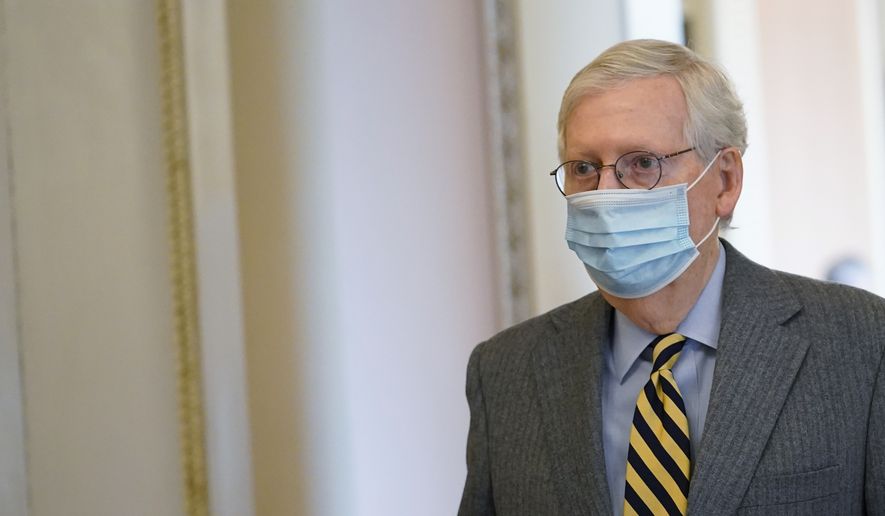Senate Majority Leader Mitch McConnell on Wednesday said Republicans wouldn’t be “bullied” into a scattershot handout of $2,000 stimulus checks, declaring the effort all but dead in the upper chamber.
He said the nearly $500 billion plan pushed by congressional Democrats in alliance with President Trump would drive up debt and shower money on Americans regardless of whether they are impacted financially by the COVID-19 pandemic.
“The Senate is not going to be bullied into rushing out more borrowed money into the hands of Democrats’ rich friends who don’t need the help,” Mr. McConnell, Kentucky Republican, said on the Senate floor.
He said the plan, despite Mr. Trump’s escalating pressure on Republican senators this week, had “no realistic path to quickly pass the Senate.”
Later, Senate Minority Leader Charles E. Schumer called for an immediate up-or-down vote on the $2,000 payments, saying time was running out to help suffering Americans. The Democratic House has already endorsed Mr. Trump’s push to raise the COVID-19 relief checks for midde- and lower-income individuals from the current $600 to $2,000.
“The only way to get the American people the $2,000 checks they deserve and need is to pass the House bill and pass it now,” said Mr. Schumer, New York Democrat.
SEE ALSO: Schumer: Senate would pass $2,000 stimulus checks bill on up-or-down vote
The extra spending would be on top of a $900 billion coronavirus relief package reluctantly signed into law this week by Mr. Trump. It ranked as the second largest relief package in U.S. history, eclipsed only by the $2.2 trillion coronavirus bill known as the CARES Act from the spring when the U.S. economy was in a virus-induced freefall.
The package Mr. Trump signed on Sunday was the culmination of eight months of negotiations, and had been hailed by his own Treasury secretary, Stephen Mnuchin. It included roughly $284 billion for another round of Paycheck Protection Program loans, $25 billion in rental assistance, an extension of the national eviction moratorium, and $82 billion for schools and colleges grappling with reopening and distance learning. It also started another round of extra unemployment benefits.
It included $600 direct payments to individuals making $75,000 a year or less. The payments phase out at higher income levels and there’s an additional $600 payment per dependent child.
Those checks are already being sent out.
Mr. Mnuchin said some of the $600 payments were being sent by direct deposit to Americans’ bank accounts Tuesday night and paper checks began going out Wednesday.
The House-passed bill to increase the checks to $2,000 would send the checks to families making well above six figures, including some families of four making $300,000 and families of three making $250,000 a year.
“It’s no secret Republicans have a diversity of views about the wisdom of borrowing hundreds of billions more to send out more non-targeted money, including to many households that have suffered no loss of income during the crisis,” said Mr. McConnell.
Support for the bigger checks garnered support beyond Mr. Trump in the GOP ranks, including from the Sens. David Perdue and Kelley Loeffler, who are locked in tough runoff races Tuesday in Georgia. Sen. Josh Hawley, Missouri Republican and another backer of the higher payout, said Wednesday Mr. Trump’s position would win if Mr. McConnell allowed an up-or-down vote.
The majority leader’s latest maneuvering, however, makes that unlikely before the congressional session expires for good on Sunday.
On Tuesday, Mr. McConnell said he would link any vote on the $2,000 checks to a congressional inquiry into election fairness and a repeal of liability protection for social media giants such as Facebook and Twitter. Both are also priorities for Mr. Trump but their inclusion would all but guarantee the combined package would fail in the Senate.
Democrats have been delaying a vote on overriding Mr. Trump’s veto of a major defense bill to force a vote on increasing the direct payments to $2,000.
⦁ This article is based in part on wire service reports.
• S.A. Miller can be reached at smiller@washingtontimes.com.




Please read our comment policy before commenting.